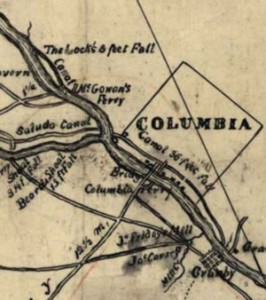Editor’s note: With all of the flooding from the last week, we thought readers might find it interesting to see how flooding impacted this Midlands area almost 200 years ago.
 S.C. Encyclopedia | Situated at the head of navigation of the Congaree River, Granby was among the first important trading posts in the South Carolina interior. The town originated as a large Indian village on Congaree Creek. In 1716 colonial officials entered into an agreement with the Cherokee Indians to establish the first inland trading post. With the addition of a fort in 1748, the site became known as Congaree Fort. In 1754 a Swiss immigrant named Friday purchased one hundred acres on the Congaree and established a ferry. The area became known as Granby, where a trading post was built in 1765 by merchants James Chesnut and Joseph Kershaw. This two-story frame building stood for almost two hundred years. Occupied by the British during the Revolutionary War, it was known as Fort Granby and was the site of several skirmishes between British and patriot forces. The wartime heroine Emily Geiger was interrogated by the British during the time they occupied Fort Granby.
S.C. Encyclopedia | Situated at the head of navigation of the Congaree River, Granby was among the first important trading posts in the South Carolina interior. The town originated as a large Indian village on Congaree Creek. In 1716 colonial officials entered into an agreement with the Cherokee Indians to establish the first inland trading post. With the addition of a fort in 1748, the site became known as Congaree Fort. In 1754 a Swiss immigrant named Friday purchased one hundred acres on the Congaree and established a ferry. The area became known as Granby, where a trading post was built in 1765 by merchants James Chesnut and Joseph Kershaw. This two-story frame building stood for almost two hundred years. Occupied by the British during the Revolutionary War, it was known as Fort Granby and was the site of several skirmishes between British and patriot forces. The wartime heroine Emily Geiger was interrogated by the British during the time they occupied Fort Granby.
After the war, Granby continued to flourish. When Lexington County was established in 1785, Granby was named the seat of government. President George Washington visited Granby on his southern tour in 1791 and recorded a favorable impression of the prosperous town. In 1802 John Drayton described Granby as a settlement of two hundred houses, considerably larger than neighboring Columbia which had between eighty and one hundred houses. But the growth of Columbia eventually eclipsed Granby. Constant flooding forced the removal of the county seat to Lexington in 1820. By 1826 Robert Mills observed that Granby was “nearly deserted.” All that remains is the Granby Cemetery, which has gravestones dating to the eighteenth century.
– Excerpted from the entry by Leo Redmond. To read more about this or 2,000 other entries about South Carolina, check out The South Carolina Encyclopedia by USC Press. (Information used by permission.)



 We Can Do Better, South Carolina!
We Can Do Better, South Carolina!
























